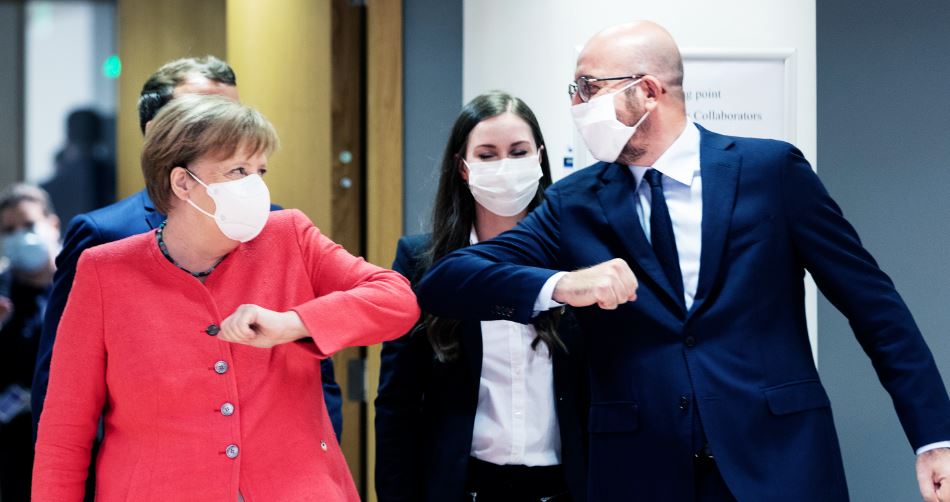It took four days of almost constant and uninterrupted negotiations, but in the end, a deal was made: EU leaders agreed on a roadmap out of the coronavirus economic crisis in the early hours of this morning, with the package predictably hailed as “historic” by almost all involved.
Historic it might be, but that is hardly a positive development: instead, it will further intensify EU integration in areas where an “ever closer union” is unwise; it will further endanger the fiscal health of Europe, with an extra €1.8tn of spending now slated between now and 2027; and it will certainly do no good to unity within the bloc, with a north-south rift that has drastically widened in the last few weeks.
A funding program on this scale had been in the works ever since the economic repercussions of Covid-19 became clear. The stakes are obvious enough, with the European economy estimated to shrink by 8.3% this year. So, the logic went, Brussels would need to do more than ever before to get the continent’s economy back on track. Angela Merkel and Emmanuel Macron initially pushed for a mere €500 billion fund, only to be gazumped by the European Commission, which thought €750 billion was nearer the mark.
In the Commission’s original plans, €500 billion would be issued as non-repayable “grants” – mainly to Spain and Italy – with the remaining €250 billion as loans. All the money, be it grants or loans, will be provided by the European Commission issuing bonds on financial markets. Many observers saw this – correctly – as an indirect way to fully implement debt collectivisation.
It’s fair to say this did not go down well with all member states. The so-called ‘Frugal Four’ of the Netherlands, Austria, Sweden, and Denmark argued that a crisis was no reason to jettison fiscal responsibility or hurry through ill-conceived policies.
At this weekend’s summit, the “Frugals” – who now numbered five with the addition of Finland – once more rebelled against the Merkel-Macron-Brussels troika – which had enthusiastic support from the recipient countries in the south. Italy’s Giuseppe Conte accused the Frugals of blackmailing Europe, Poland’s Mateusz Morawiecki called the rebels “misers” and Bulgaria’s Boyko Borisov accused them of wanting to be “the police of Europe” holding other member states hostage. Never mind, of course, that it was the sceptical countries that would be shelling out a disproportionate amount of money and seeing very little in return.
Hungary’s Viktor Orbán in particular attacked Dutch premier Mark Rutte, the de facto rebel leader, for wanting to implement a “rule of law mechanism” which would prevent funds being sent to governments – like Orbán’s – with authoritarian or autocratic tendencies. Orbán seemed confused as to why Rutte “hates” him and Hungary so much. He even compared Rutte to the Communist-era police at one point.
And yet, for all this tempestuous war of words, and while the Frugals did score some small wins, the original Commission proposals remained largely intact.
The EU, as part of the Recovery Fund, will splash out the planned €750 billion over the next two years to prop up the worst-affected economies. Only €390 billion of this will now be grants, i.e. free gifts from the north to south, instead of €500 billion. That’s still a big disappointment for Rutte and his allies, who promised just a few weeks ago that they would not agree to any grants whatsoever. Worse still, while there is some uncertainty over the “rule of law mechanism,” that particular can has been kicked down the road, with both the Hungarian and Polish governments both able to loudly claim victory.
The EU’s multi-annual budget, which will run from 2021 to 2027, is now close to the size that the “Frugals” argued was unacceptable back in February, before the pandemic has begun to really bite. Funds for the Common Agricultural Policy will even be increased for reasons of “regional development”. Finally, and perhaps most worryingly, EU member states seem to agree that Brussels should receive new “own resources” to finance the budget, including a plastic tax, a digital tax, and a Financial Transaction Tax. That means more taxes EU citizens (not the best way to get out of a crisis), along with a transfer of yet more powers to Brussels.
There was some positive news for the rebels: the rebates for some member states will stay in place and even increase for the Frugal countries themselves.
This whole process shows the limitations of what fiscally responsible countries can achieve in the EU. Unable to steer the union in a more realistic direction, one based on national sovereignty and free trade, they are reduced to preventing the worst outgrowths of uber-federalism, while otherwise nodding through the expansion of Brussels’ writ and winning a few small concessions for themselves. In that respect, the likes of the Netherlands have taken on a role not all that different from the UK’s before Brexit.
In the longer run, this could mean those other northern member states, as with the UK, growing steadily further apart from the rest of the EU. There seems little prospect of any immediate fissure, rather a long, attritional process over time. Viewed in that light, this weekend’s agreement may indeed be a ‘historic’ moment – the first step on a path that could ultimately see a truly two-speed EU in the future.
Click here to subscribe to our daily briefing – the best pieces from CapX and across the web.
CapX depends on the generosity of its readers. If you value what we do, please consider making a donation.


